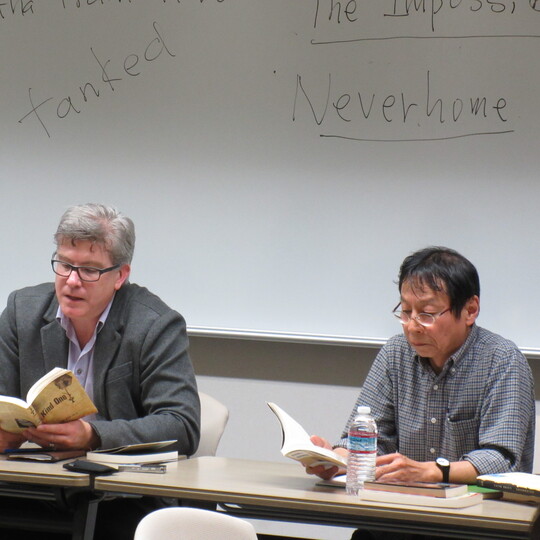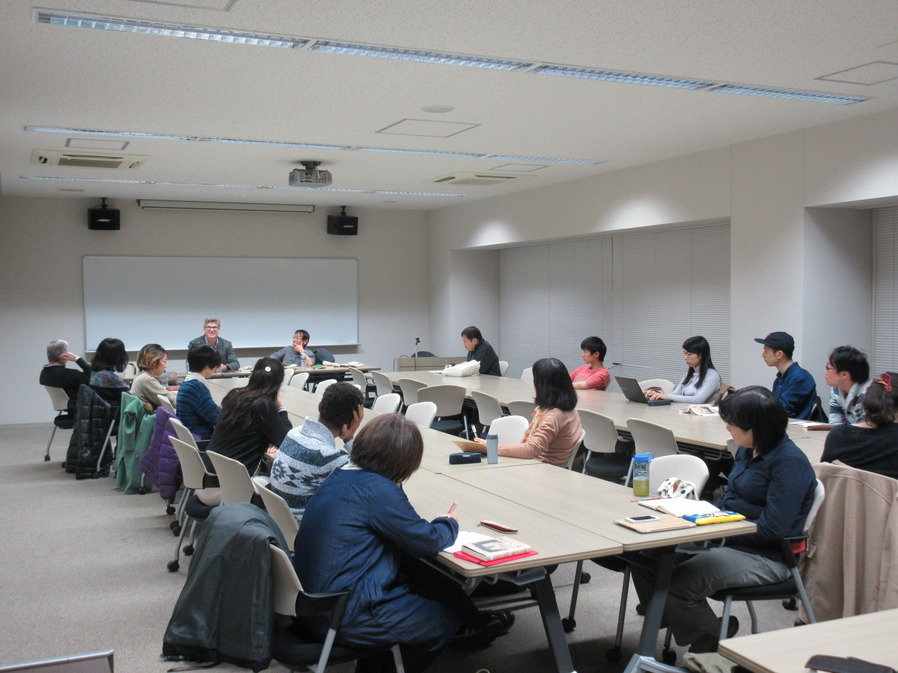
Report: Project 5 "Critiquing Diversity" lecture series
Imagining Other Times, Dreaming Other Places: A Talk and Reading by Laird Hunt with Motoyuki Shibata
Lana Sinapayen
- Time and Date
- 19:00-20:30, Tuesday, December 1, 2015
- Venue
- Collaboration Room 1, 4th Floor, Building 18, The University of Tokyo, Komaba
- Speaker
- Laird Hunt (Writer), Motoyuki Shibata (Translator, Project Professor of the University of Tokyo)
- Organized by
- the Educational Project 5 "Cultural Diversity and Imagination," Integrated Human Sciences Program for Cultural Diversity, The University of Tokyo
In this talk, Mr. Laird Hunt and Mr. Motoyuki Shibata discussed the beginnings of the former as a writer, his sources of inspiration, and their relationship as writer and translator. The most surprising part of the talk for me was Motoyuki Shibata's explanation about his perspective as a translator. In this report, I will principally extrapolate on this subject.
Toward the end of the talk, I asked Motoyuki Shibata what he usually does when he wants feedback from writers about his translation. His reaction illustrated the fact that I had a misinterpreted image about his daily work as a translator, as he first asked me what I meant by "feedback."
I had imagined translation as a kind of teamwork, where the translator and the writer worked on the manuscript, and my first question to Laird Hunt was: "Can you read Japanese?" as I thought that he, perhaps, needed to personally validate the translated manuscript before publication. As Laird Hunt answered that he could not, in fact, read Japanese, I imagined that maybe Motoyuki Shibata discussed with him in person about some parts of the book, or maybe, had email conversations.
However, Motoyuki Shibata said that he adopts the perspective of the reader while translating books. The readers do not have access to what the writer is thinking and they cannot discuss with him directly either. Therefore, Motoyuki Shibata, as well, avoids asking for feedback to the authors he translates for. Rather, he seeks feedback from the readers of the original and the translated story.
Although this was a completely new perspective for me and therefore interesting, I think that there are cases where this approach would be problematic. The first example I have in mind is ongoing book series. The most famous example might be the Harry Potter books. Due to their extreme popularity, some of the books were translated prior to the publishing of the most recent original books. This leads to practical issues, as some hints to the mysteries solved in the preceding books are hidden in the earlier books. The risk for these hints to be lost in translation being very high, JK Rowling had to provide specific instructions to the translators about how to translate some of the characters' names and dialogue.
Even taking each book separately, JK Rowling is famous for her erudition in several languages, and I think it is just not possible for a single translator, alone, to capture half the richness of the wordplay and such without input from the original author.
I can picture how relying on one's own understanding to translate entire stories from one language to another must be a huge part of the interest of being a translator. It truly makes the translation a work of art colored by the translator's experience of the life and view of the story.
However, I am not convinced that it is always entirely fair to the reader, or for that matter, to the writer. If personally given the choice between reading a translation that was born from brainstorming of both the writer and the translator, and reading a one-sided translation, I would have the former as first choice. Similarly, if I were a writer, I would choose a translator who stays close to my meaning.
Several works have had to be translated posthumously; why not take the opportunity to acquire the author's input while we can? In the current "connected world," numerous anonymous readers actually have the chance to discuss with their favorite author and ask questions about the book. Being a reader no longer means being shut out from the author's world and mind.
I do believe that some translations can be better than the original work, just as some covers are much better than the original song. They can also deliver an experience that is simply different, and therefore, hardly comparable to the original work. In that case, the one-sided translation can truly be a stand-alone work. Hence, listening to the bilingual reading was undoubtedly a great experience.

report date : December 15, 2015
